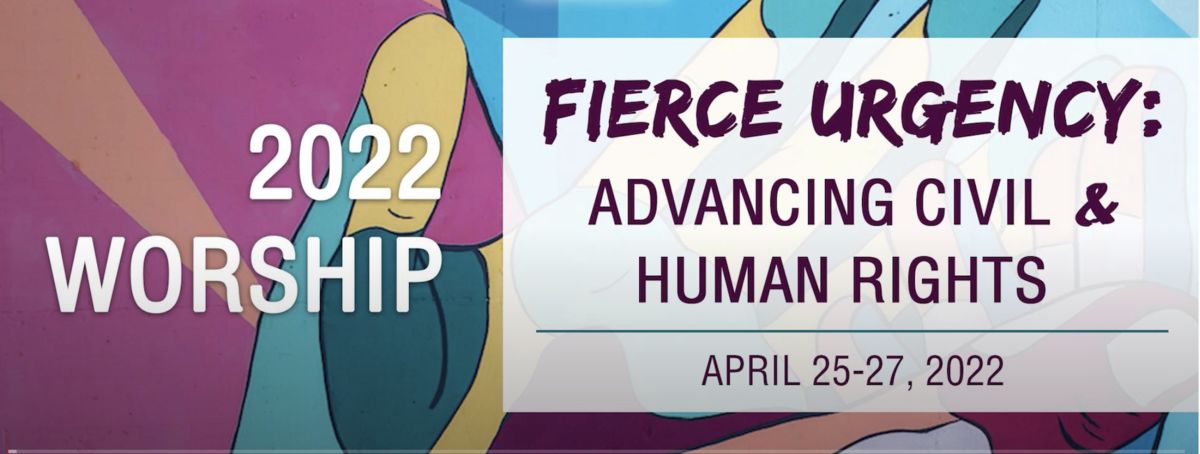2022 Ecumenical Advocacy Days Push to Advance Civil and Human Rights
PART ONE: Advocacy for U.S. Civil and Voting Rights

This is a two-part series highlighting the Ecumenical Advocacy Days (EAD) Conference that took place April 25 – 27, 2022.
Over the course of three days, more than 500 people of faith gathered virtually to learn, pray, worship and advocate for civil and human rights. The EAD virtual conference included two plenaries: One on the U.S. issue of voting rights and one addressing global human rights.
National leaders Dr. Barbara Williams-Skinner, Rev. Dr. Otis Moss III, and Rev. Dr. Liz Theoharris provided theological grounding for the conference. Devotional sessions were offered by Dr. Jessie Smith of The General Board of Church and Society. More than 30 workshops were held along with evening sessions of poetry, documentary films and a virtual exhibit hall for sponsoring organizations.
On the final day, EAD conference members conducted 32 Senator visits across 23 states advocating for voting rights and human rights. They called for the passage of the Freedom to Vote: John R. Lewis Act, a comprehensive voting rights bill that would protect and expand access to the ballot. In addition, EAD participants lifted up the SAFEGUARD ACT, a bill calling for more transparency in U.S. arms sales exports.
Also, during this year’s conference, the EAD raised funds for the Black Voters Matter Capacity-Building Institute and the International Coalition for Human Rights in the Philippines.
Theological and Biblical Grounding
Untie the Tied
Rev. Dr. Otis Moss III, senior pastor of Trinity UCC of Chicago, preached during opening worship. Rev. Moss concentrated his message on the time Jesus entered Jerusalem according to the Gospel of Luke and instructed disciples to go and “untie the colt.”
Moss used the motif of the colt to describe those in our society who are “tied up” and locked down in society. He noted that we too are instructed to enter the city and “untie” persons and ideas that have been tied down and tied up by those in power.
Repentance, Restitution and Reconciliation
Dr. Barbara Williams-Skinner called on participants to live out their Christian identity that is centrally about uplifting the least of these. “The fierce urgency of now is not just about restoring human and civil rights,” said Skinner. “But it is about restoring our faith.”
Addressing injustice as part of “neighbor love,” is something that cannot be overcome alone, but rather through the power of God’s redeeming love working in and through our “surrendered lives.”
Skinner called for “repentance, restitution, and reconciliation” as Christian practice in response to “land theft, human enslavement, continued oppression of minority communities, marginalization of women of color and white Christian nationalism.”
Closer to Victory, Stronger the Opposition
Finally, Rev. Dr. Liz Theoharis, co-chair of the Poor People’s Campaign encouraged participants to keep struggling for just policies and programs even in the face of great opposition. “We are so close to victory, on voting rights, living wages, and expanded healthcare,” said Dr. Theoharis. “It’s because we are so close, that we are living through a concerted attack on these rights, a doubling down on repression and oppression.”
Drawing on the story of the Israelites being liberated out of Egypt only to find themselves in the wilderness without water, Dr. Theoharis pointed out, “sometimes, it gets worse for God’s people before it gets better: a plague in the Bible is not a storm to be weathered before normalcy, it’s a call to come together in new ways in order to survive, hold the powerful responsible for unjust policies and lies, and rebuild and renew foundations of love and justice.”
Theoharis named that, through Jesus’ life and in his death, according to the Gospel of Matthew, the lives of the prophets are raised. They continue to speak to us and encourage us to work for justice today.
Voting Rights
Voter Suppression is a Moral Issue
Associate General Secretary of the National Council of Churches, Rev. Aundreia Alexander addressed U.S. voting rights by interviewing Cliff Albright of Black Voters Matter Capacity-Building Institute. Albright alongside his co-founder LaTosha Brown leads the grassroots movement Black Voters Matter, working to organize voters of color in states that are seeking to restrict the vote of black and brown communities.
“This is a moral issue, right? This is about our humanity. This is about love for each other,” Albright stated when asked about voting rights. He continued to connect the implications of voter suppression with the consequences of the pandemic.
“Voter suppression is a violent crime, because it has violent impacts in our lives,” Albright said. “If we didn’t know that before COVID, then we need to know that now. If we didn’t know that voter suppression contributes to leadership or lack of leadership, we know that it can literally be a matter of life or death.“
According to Albright, we have lost hundreds of thousands of lives because people in some states and at the national level of the first year or so of the pandemic didn’t care about life and only cared about the politics of it.
He noted, however, that the hope to respond comes in organizing, and encouraged people to reach out to five people they know and talk about voting rights.
Albright encouraged the faith community to engage, “If it’s a moral call, then you can’t tell me there’s no role for our faith institutions to be involved…It’s a critical starting point, because our history shows us that when we involve our faith, involve our churches, there’s nothing our movement can’t achieve,” Albright said.
For more information on how UM congregations can be involved in the electoral process, visit: https://www.umcjustice.org/documents/143.
Up next, part 2 in the EAD series: Human Rights – Philippines, Palestine/Israel, Colombia.